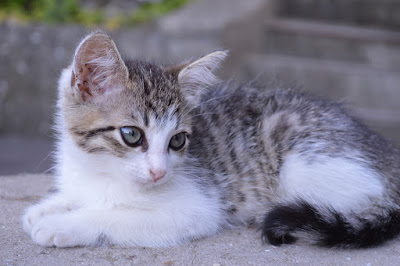Common Pets Diseases
Common Dog Diseases & Symptoms
As a dog
owner, it is important to recognize the signs and symptoms of common dog diseases illnesses
so you can seek veterinary help for your dog as soon as possible.
Cancer
Symptoms of
cancer in dogs (which are not always malignant, but should always be examined
by a vet)
·
Swelling
·
Persistent
sores
·
Abnormal
discharge from any part of the body
·
Bad
breath
·
Listlessness/lethargy
·
Rapid,
often unexplained weight loss
·
Sudden
lameness
·
Black,
tarry stools (a symptom of ulcers, which can be caused by mast cell tumors)
·
Decreased
or loss of appetite
·
Difficulty
breathing, urinating or defecating
Contact your
veterinarian immediately if your dog shows any of the clinical signs mentioned
on the list above
Diabetes
Diabetes in
dogs is a complex disease caused by either a lack of the hormone insulin or an
inadequate response to insulin.
Diabetes
Symptoms in Dogs:
·
Change
in appetite
·
Excessive
thirst/increase in water consumption
·
Weight
loss
·
Increased
urination
·
Unusually
sweet-smelling or fruity breath
·
Lethargy
·
Dehydration
·
Urinary
tract infections
·
Vomiting
·
Cataract
formation, blindness
·
Chronic
skin infections
If your dog is
showing any abnormal clinical signs as listed above, make an appointment to see
your veterinarian immediately. If a diabetic dog is not treated, he can develop
secondary health problems like cataracts and severe urinary tract problems.
Heartworm
Heartworm is a
parasitic worm that lives in the heart and pulmonary arteries of an infected
animal.
Heartworm
Symptoms:
·
Labored
breathing
·
Coughing
·
Vomiting
·
Weight
loss, listlessness and fatigue after only moderate exercise
Some dogs
exhibit no symptoms at all until late stages of infection
Kennel
Cough
Kennel cough
is a term loosely used to describe a complex of respiratory infections—both
viral and bacterial
Symptoms of
Kennel Cough:
·
Gagging
·
Coughing
up white foamy phlegm
·
Fever
·
Nasal
discharge
Rabies
Rabies is a
viral disease that may affect the brain and spinal cord of all mammals,
including cats, dogs and humans.
Symptoms of Rabies:
·
Changes
in behavior (including restlessness, apprehension, aggression or irritability)
·
Biting
or snapping at any form of stimulus
·
Attacking
other animals, humans and even inanimate objects
·
Licking,
biting and chewing at the bite site
·
Fever
·
Hypersensitivity
·
Hiding
in dark places
·
Eating
unusual objects
·
Paralysis
of the throat and jaw muscles
·
Foaming
at the mouth
·
Paralysis
of the hind legs
·
Loss
of appetite
·
Weakness
·
Seizures
Ringworm
Ringworm
Symptoms:
·
Skin
lesions that typically appear on the head, ears, paws and forelimbs.
·
Ringworm
can patchy, crusted, circular bald spots that sometimes look red in the center
·
In
mild cases, there may be just a few broken hairs, while bad cases can spread
over most of a dog’s body.
·
It’s
also possible for a pet to carry the fungus and not show any symptoms
whatsoever.
Treating Ringworm
Bathe all pets
in the household with a medicated rinse or shampoo.
Wash the
infected animals’ bedding and toys with a disinfectant that kills ringworm
spores.
Frequently
vacuum to rid the house of infected hairs and skin cells. (Yes, the fungus can
survive on hair and skin that your dog sheds!)
As a cat
owner, it is important to recognize the signs and symptoms of common illnesses
so you can seek veterinary help.
Cancer
Cancer is a
class of diseases in which cells grow uncontrollably, invade surrounding tissue
and may spread to other areas of the body.
Cancer
Symptoms
·
Lumps
(which are not always malignant, but are always worth having a veterinarian
examine)
·
Swelling
·
Persistent
sores or skin infections
·
Abnormal
discharge from any part of the body
·
Bad
breath
·
Weight
loss
·
Sudden
lameness
·
Diarrhea
or vomiting
·
Scaly
and/or red skin patches
·
Decreased
or loss of appetite
·
Difficulty
breathing, urinating or defecating
·
Change
in behavior
·
Contact
your veterinarian immediately if your cat shows any of the clinical signs mentioned
on the list above.
Diabetes
Diabetes in
cats is a complex disease caused by either a lack of the hormone insulin or an
inadequate response to insulin.
Diabetes
Symptoms in Cats:
·
Change
in appetite (either increased or decreased)
·
Weight
loss
·
Excessive
thirst/increase in water consumption
·
Increased
urination
·
Urinating
in areas other than litter box
·
Unusually
sweet-smelling breath
·
Lethargy
·
Dehydration
·
Unkempt
hair coat
·
Urinary
tract infection
If your cat is
showing any abnormal clinical signs as listed above, make an appointment to see
your veterinarian immediately.
Feline
Immunodeficiency Virus (FIV)
Cats infected
with feline immunodeficiency virus (FIV) may not show symptoms until years after
the initial infection occurred.
If your cat is
demonstrating any of the following symptoms, please have examined by your
veterinarian:
·
Enlarged
lymph nodes
·
Fever
·
Anemia
·
Weight
loss
·
Disheveled
coat
·
Poor
appetite
·
Diarrhea
·
Abnormal
appearance or inflammation of the eye (conjunctivitis)
·
Inflammation
of the gums (gingivitis)
·
Inflammation
of the mouth (stomatitis)
·
Dental
disease
·
Skin
redness or hair loss
·
Wounds
that don’t heal
·
Sneezing
·
Discharge
from eyes or nose
·
Frequent
urination, straining to urinate or urinating outside of litter box
·
Behavior
change
Heartworm
Spread by
infected mosquitoes, heartworm is increasingly being recognized as an
underlying cause of health problems in domestic cats
The following
signs may indicate that your cat has been infected:
·
Persistent
cough
·
Breathing
difficulties (panting, wheezing, rapid or open-mouthed breathing)
·
Depression
·
Loss
of appetite
·
Weight
loss
·
Sporadic
vomiting
·
Lethargy
Ringworm
Although the
name suggests otherwise, ringworm isn’t caused by a worm at all—but a fungus
that can infect the skin, hair and nails.
Ringworm
Symptoms:
·
Ringworm
can cause flaky bald patches that sometimes look red in the center.
·
In
mild cases, there may be localized areas of redness or simply dandruff, while
more severe infections can spread over a cat’s entire body.
·
It’s
also possible for a pet to carry ringworm spores and not show any symptoms
whatsoever.
·
Psittacosis (Parrot fever)
·
Lack of appetite
·
Difficulty breathing
·
Depression
·
Watery, green droppings
·
Discharge from eyes and nose
·
Antibiotic treatment under the proper care of
your avian vet can result in successful treatment of your parrot.
·
Polyomavirus
·
Specific
signs that your bird might be infected:
·
Swollen abdomen
·
Loss of appetite
·
Vomiting or diarrhea
·
Weight loss
·
Dehydration
·
Pacheco’s Disease
·
Specific symptoms include:
·
Tremors
·
Lethargy
·
Sinusitis
·
Anorexia
·
Green droppings
·
This deadly, viral disease is caused by a form of the herpes
virus. It is spread through infected feces and nasal discharge.
·
Giardia
·
A protozoal disease with these symptoms:
·
Diarrhea
·
Dry itching skin
·
Weight loss
·
Bulky stool
·
This parasitic disease can be passed from infected birds through
cysts released into the bird’s feces. It can be treated with antibiotics and
usually requires several courses as it often recurs.
·
Bacterial Infection
·
Specific signs include:
·
Discharge in the choana or nares
·
Plaques or white, ropy mucus in the oropharynx
·
Wheezing
·
Sinusitis
The
only way to determine if indeed there is a bacterial infection is a blood test.
Treatment is with antibiotics and if caught in time prognosis is good.





0 comments:
New comments are not allowed.